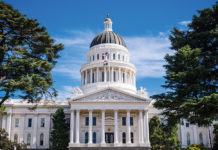Do you claim to be a Democrat, Republican or do you “decline to
state?” Or perhaps you claim to be an “independent,” whatever that
means anymore.
Two things are for sure: fewer and fewer people are claiming to
be a proud member of either major party and dislike for the
opposite party is at a record high.
Perhaps the healthy thing here is that the large majority of
voters know bad behavior and lack of courageous leadership when
they see it, no matter if it is red, blue or tea party-colored.
With pending budget doom lingering over both Sacramento and the
U.S.
Congress, all we see is a partisan stand-off and a dangerous
disregard for everyday working people, public employees, children
and the elderly.
If the Republican House Majority and Democratic President Obama
fail to move a bold inch to the middle ground this week, the
federal government will shut down on Friday.
The same doom’s day scenario is being played out in Sacramento,
with the “no new tax” Republicans unwilling to let us vote in June
on current tax extensions. California’s budget is $24 billion in
deficit. Gov. Jerry Brown has proposed $12 billion in spending cuts
for next year and he wants to ask voters if they will extend the
current taxes to pay for the other $12 billion shortfall.
Brown’s “50-50” budget solution sounds like a reasonable middle
ground that a majority of elected officials could support. An “all
cuts” state budget would mean the closing of state college
campuses, libraries, health programs and worse.
Brown’s proposed $12 billion in cuts already reduces state
college and university funding by 18 percent, reducing it to levels
of 10 years ago when there were 70,000 fewer college students.
Imagine having to double that amount of cuts, if the state
Republicans get what they want.
Last week, in a national Gallup Poll, “approval levels” for the
country’s two major parties were found to be at record lows. Only
32 percent of Democratic voters and 31 percent of registered
Republicans said they “approved” of the opposing party. Inside each
party less than six in 10 “approved of their own party’s positions
and behavior. That seems to go way beyond a simple “decline to
state.”
And, speaking of the Independents, only three in 10 of them said
they cared for either party.
In the U.S. Congress, the Republican House leadership has
proposed a “Path to Prosperity” budget that would cut $6.2 trillion
in federal spending over the next 10 years. This vision of
prosperity includes zero funding cuts for the Pentagon but seeks
the end to Medicaid as we know it.
Pick the name of your least favorite elected official — Obama,
John Boehner, Nancy Pelosi, Harry Reid, Mitch McConnell — we all
have a “least favorite.” But many of us no longer have a
“favorite,” let alone a favorite political party.
In past times, and in other places, you’d expect to see the
winds of change beginning to blow by now. When a government’s
leadership is so lacking and self-interested and this arrogant,
you’d expect to begin to hear angry voices and new political
movements.
Perhaps that is what the Tea Party offers us, though many of us
shudder at the thought. The national election of 2012 promises
(threatens) to be one of historical change. But don’t bet on it,
not when the majority of voters within either major party can’t
approve of themselves and wouldn’t dare trade sides.
California will hold its first “open primary” this year where
party members can cross lines to vote for any party’s candidate —
or none of the above. The rest of the nation will no doubt be
watching this electoral experiment.
Where you find a growing number of voters who “decline to
state,” you will also find a declining state.
— Rollie Atkinson
50.1
F
Healdsburg
April 20, 2025







